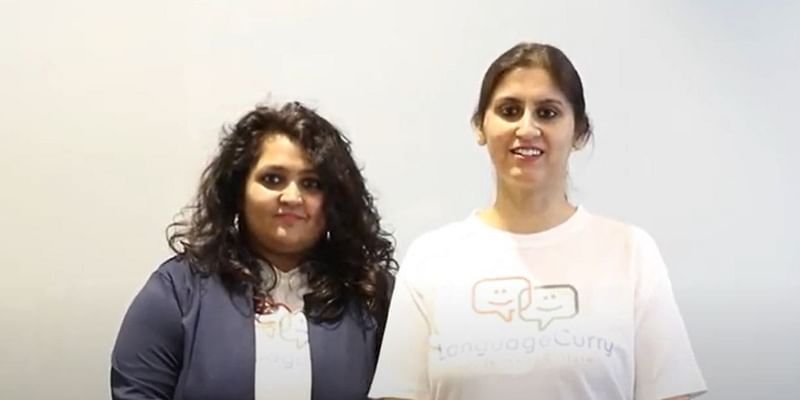This startup by women entrepreneurs helps NRIs, expats and tourists learn the diverse languages of India
Founded in 2017, Gurugram-based Language Curry is helping people learn regional Indian languages. They also enable NRIs, expats and tourists to learn various Indian languages.
Beautiful things happen when mothers meet. In the case of Aneesha Jyoti and Vatsala Sharma, a brief exchange of ideas led to entrepreneurship – a work of passion that demands the two young mothers to work ten hours every day. Along with Puneet Singh, they founded the language learning platform Language Curry in Gurgram in late 2017.
Today, most companies are making the best of India’s language training market, forecasted to grow at CAGR of 18.54 percent from 2017 to 2021, by focusing on foreign languages. On the other hand, Language Curry has entered the market by focusing on the rich regional languages of India.
The entrepreneurs have a clear idea of where the startup is headed and state that learning Hindi has more searches on Google than learning French, German, or Mandarin.

Vatsala Sharma and Aneesha Jyoti, Co-founders of Language Curry
The journey
Aneesha had moved to Canada when she was 17, and a major part of her life abroad involved her mother constantly advising her to be in sync with her identity as an Indian.
Now, as a mother herself, she retained that advice which has led her to value every language and start up a language learning platform that teaches many different languages in India. Post the break of one-and-a-half years after giving birth, the MBA graduate started working as a freelance digital marketing consultant. Being in constant touch with startups inspired her to explore her choices and become an entrepreneur.
Aneesha could not have met Vatsala at a better time to germinate the idea that would become .
Vatsala, who used to work as a chartered accountant at Standard Chartered Bank, realised that she was spending 10 hours away from her son every day. A young mother, she wanted the hours away from her child to be worth it and quit her jobs to start a learning and development firm imparting corporate training and soft skills development.
Vatsala says that Aneesha’s idea of moving into the language space felt right as a mother and as an entrepreneur.
Lessons in language
Based on Aneesha’s personal experience, the platform was initially targeted to help the community of Non-resident Indians (NRIs). However, they soon found a wide array of the audience in expats wanting to learn Hindi. Indians also wanting to learn languages other than their mother tongue to better connect with their in-laws, colleagues, or their bosses.
Recalling an initial meeting at a Café Coffee Day outlet in Delhi, Vatsala shares, “We saw this Japanese guy who was speaking to the waiter in fluent Hindi and we were blown away. We went up to talk to him and learnt that his company is spending a lot for him to learn the language.”
Since, they started tracking expats in Delhi-NCR, interacted with them and found out what ways of learning a new language was working and what was not. After multiple research, they concluded that the best way is to look at the way a child learns a language, which is the most natural pedagogy.
This includes being verbally exposed to a language and associating meanings through an image or an object.
The USP of Language Curry is that it focuses on the colloquial language. In addition to giving cultural contexts, they would teach that the Hindi word bahut (meaning ‘a lot’) is generally pronounced as bohot.
Bootstrapped so far, the startup launched its app last year which was downloaded 35,000 times by tourists, international students, NRIs, and others from 120 countries.
At present, it offers five languages including Hindi, Sanskrit, Punjabi, Gujrati, and Kannada. Few more languages like Tamil, Marathi, Telegu, and Malayalam, will be launched in the coming months.
Notably, Sanskrit is gaining popularity on the app with more than 10,000 users signing up to learn the language, making it the second most learnt language on the app after Hindi.
“Unfortunately or fortunately, Indians are becoming aware of yoga because it has taken over the world. It is a similar pattern with Sanskrit as well. Foreigners want to learn it to know the root and origin of many words and languages,” Aneesha notes, clarifying that Sanskrit can be learnt as a conversational language and does not necessarily have to be about religious scripts.
Recently, they started a Sanskrit course for children and there are now two batches of it. Calling it the most scientific language, Aneesha shares that the word ‘water’ has many synonyms in Sanskrit and each word denotes a feature of the water.
“For example, the word जलम् (jalam) describes that from its liquid state, water can become solid. The root of the word ‘jalam’ is ‘jal’ which means to harden. The word नीरम् (nīram) comes from the root-sound nee, meaning that which leads or always moves ahead. The word वारि (vāri) means that which evaporates, turns into a cloud, and covers,” they explain.
The challenges
While the entrepreneurial journey has been fulfilling, it was not without challenges. They recalled the initial days of meeting investors who would ask if their husbands were aware of the work they were going to pursue.
They get asked of their husband’s opinion, “which will never be the case for male entrepreneurs”.
People also cast doubts on whether they could commit to the startup, even after explaining the ideas and their plan with passion. “When we mentioned that we have children and will be working from home, for some reason, people thought that we will not be committed to the work and be on it full time.”
Aneesha and Vatsala are ignoring the sexism and are focused on their work. Having invested Rs 15 lakh so far, they hope to expand their team and be the go-to destination for anything to do with Indian languages and culture.
The startup also hopes to include as many Indian and foreign languages on the platform in the future.
Edited by Kanishk Singh











